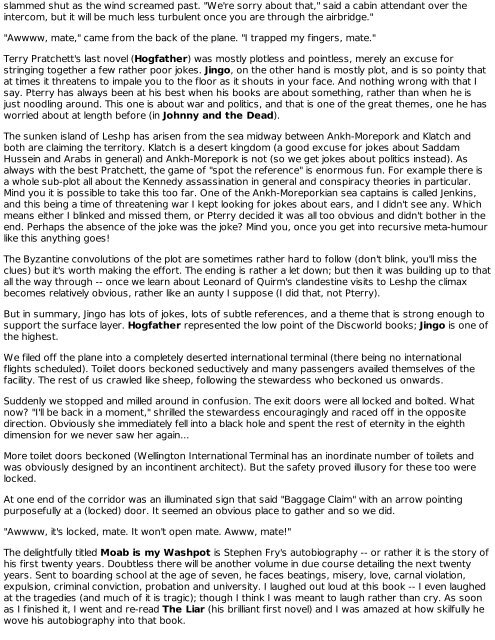Triffids Beard 2 - The Bearded Triffid
Triffids Beard 2 - The Bearded Triffid
Triffids Beard 2 - The Bearded Triffid
You also want an ePaper? Increase the reach of your titles
YUMPU automatically turns print PDFs into web optimized ePapers that Google loves.
slammed shut as the wind screamed past. "We're sorry about that," said a cabin attendant over the<br />
intercom, but it will be much less turbulent once you are through the airbridge."<br />
"Awwww, mate," came from the back of the plane. "I trapped my fingers, mate."<br />
Terry Pratchett's last novel (Hogfather) was mostly plotless and pointless, merely an excuse for<br />
stringing together a few rather poor jokes. Jingo, on the other hand is mostly plot, and is so pointy that<br />
at times it threatens to impale you to the floor as it shouts in your face. And nothing wrong with that I<br />
say. Pterry has always been at his best when his books are about something, rather than when he is<br />
just noodling around. This one is about war and politics, and that is one of the great themes, one he has<br />
worried about at length before (in Johnny and the Dead).<br />
<strong>The</strong> sunken island of Leshp has arisen from the sea midway between Ankh-Morepork and Klatch and<br />
both are claiming the territory. Klatch is a desert kingdom (a good excuse for jokes about Saddam<br />
Hussein and Arabs in general) and Ankh-Morepork is not (so we get jokes about politics instead). As<br />
always with the best Pratchett, the game of "spot the reference" is enormous fun. For example there is<br />
a whole sub-plot all about the Kennedy assassination in general and conspiracy theories in particular.<br />
Mind you it is possible to take this too far. One of the Ankh-Moreporkian sea captains is called Jenkins,<br />
and this being a time of threatening war I kept looking for jokes about ears, and I didn't see any. Which<br />
means either I blinked and missed them, or Pterry decided it was all too obvious and didn't bother in the<br />
end. Perhaps the absence of the joke was the joke? Mind you, once you get into recursive meta-humour<br />
like this anything goes!<br />
<strong>The</strong> Byzantine convolutions of the plot are sometimes rather hard to follow (don't blink, you'll miss the<br />
clues) but it's worth making the effort. <strong>The</strong> ending is rather a let down; but then it was building up to that<br />
all the way through -- once we learn about Leonard of Quirm's clandestine visits to Leshp the climax<br />
becomes relatively obvious, rather like an aunty I suppose (I did that, not Pterry).<br />
But in summary, Jingo has lots of jokes, lots of subtle references, and a theme that is strong enough to<br />
support the surface layer. Hogfather represented the low point of the Discworld books; Jingo is one of<br />
the highest.<br />
We filed off the plane into a completely deserted international terminal (there being no international<br />
flights scheduled). Toilet doors beckoned seductively and many passengers availed themselves of the<br />
facility. <strong>The</strong> rest of us crawled like sheep, following the stewardess who beckoned us onwards.<br />
Suddenly we stopped and milled around in confusion. <strong>The</strong> exit doors were all locked and bolted. What<br />
now? "I'll be back in a moment," shrilled the stewardess encouragingly and raced off in the opposite<br />
direction. Obviously she immediately fell into a black hole and spent the rest of eternity in the eighth<br />
dimension for we never saw her again...<br />
More toilet doors beckoned (Wellington International Terminal has an inordinate number of toilets and<br />
was obviously designed by an incontinent architect). But the safety proved illusory for these too were<br />
locked.<br />
At one end of the corridor was an illuminated sign that said "Baggage Claim" with an arrow pointing<br />
purposefully at a (locked) door. It seemed an obvious place to gather and so we did.<br />
"Awwww, it's locked, mate. It won't open mate. Awww, mate!"<br />
<strong>The</strong> delightfully titled Moab is my Washpot is Stephen Fry's autobiography -- or rather it is the story of<br />
his first twenty years. Doubtless there will be another volume in due course detailing the next twenty<br />
years. Sent to boarding school at the age of seven, he faces beatings, misery, love, carnal violation,<br />
expulsion, criminal conviction, probation and university. I laughed out loud at this book -- I even laughed<br />
at the tragedies (and much of it is tragic); though I think I was meant to laugh rather than cry. As soon<br />
as I finished it, I went and re-read <strong>The</strong> Liar (his brilliant first novel) and I was amazed at how skilfully he<br />
wove his autobiography into that book.


